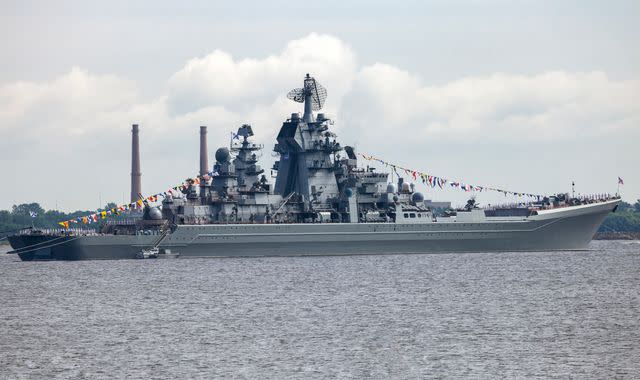Russian 'ghost ships' with underwater capabilities circled Nord Stream explosion site, documentary claims

Russian navy vessels able to perform underwater operations were present near the sabotaged Nord Stream gas pipelines prior to mysterious blasts in September, according to an investigative documentary.
The ships were tracked by a Royal Naval intelligence officer using open source intelligence and intercepted radio communications.
In September 2022, several unexplained underwater explosions ruptured the Nord Stream 1 and newly-built Nord Stream 2 pipelines that link Russia and Germany across the Baltic Sea.
Ukraine war latest - Fuel depot near crucial bridge in Crimea on fire
The blasts occurred in the economic zones of Sweden and Denmark, with both countries saying the explosions were deliberate, with no one yet deemed responsible.
The two countries have been investigating the incident with Germany, but so far, these nations have only said they believe the blasts were the result of sabotage rather than any kind of accident.
The US, Britain, Norway, Ukraine and Russia have all been blamed for the attack.
But one new lead points towards Russia's involvement, as noted in the TV documentary series Putin's Shadow War, and accompanying English language podcast Cold Front.
The latest episode, by Denmark's DR, Norway's NRK, Sweden's SVT, and Finland's Yle broadcasters, focuses on supposed suspicious ship movements ahead of the Nord Stream blasts by analysing data.
Russian navy vessels detected at explosion site
The so-called "ghost ships" involved are believed to include the Russian naval research vessel Sibiryakov, the tugboat SB-123, and a third ship from the Russian naval fleet that has not been identified.
While all of these vessels had their transmitters turned off, the broadcasters say they were able to track their movements using intercepted radio communications the ships sent to Russian naval bases between June and September last year.
The first ship to have visited the area near the Nord Stream explosion site, in around June 2022, is said to have belonged to the Russian navy due to the vessel's radio communication and the frequency used.
Another more noteworthy ship entered the area on a later date and was successfully identified as the Sibiryakov, a scientific research vessel that supports underwater activity.
The crew and specialists on board this vessel would be used to operating equipment underwater, while underwater vehicles can be launched from its stern.
The podcast also explores the idea that a charge of some sort was placed on the Nord Stream pipelines to cause a huge explosion - with the Sibiryakov being "perfectly capable of conducting that operation".
A third vessel, the naval tugboat SB-123, is said to have been in the area just five days before the explosions, with the radio communication suggesting it stayed there for the whole evening before sailing back towards Russia.
The broadcasters said satellite imagery supports the claims about the unusual routes, while other reports in Germany had reported it being in the area of the explosions on 21 to 22 September.
The series does not provide conclusive evidence of what the vessels were doing, or if Russia was definitely behind the explosions, but raises questions about the unusual nature of the activity.
Russian vessel pictured near site days before blasts
Last week, the Danish armed forces said they took 26 pictures of a Russian vessel near the site of the blasts on 22 September, just four days before three of the four pipelines were ruptured.
The Danish Daily Information said the submarine rescue ship SS-750 was the vessel photographed in the Baltic Sea before the unexplained explosions - and has its own mini-submarine called AS-26 - which can reach depths of 262ft and carry loads of up to 50kg.
"The Danish military confirmed that 26 photos of the Russian vessel were taken from a Danish patrol boat in the zone located east of Bornholm on September 22, 2022," Information said.
Read more:
US intelligence about Nord Stream doesn't make this any less murky
Pro-Ukrainian group 'responsible for Nord Stream attacks'
The documentary does not say there is conclusive proof of what the vessels were up to or that Russia was behind the blast. But it raises questions about the unusual nature of the activity.
Russia has repeatedly denied any involvement in the blasts - with the Kremlin on Tuesday calling for the investigation into the blasts of Russia-designed Nord Stream gas pipelines to be speeded up and any results to be published.
"Russian ships sail in the Baltic, and this is normal. Everyone has hundreds of photos of Russian ships," Kremlin spokesman Dmitry Peskov told a news conference when asked about the pictures.

 Yahoo News
Yahoo News 
